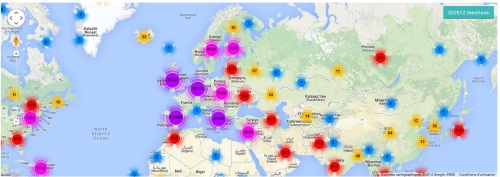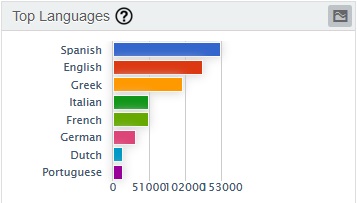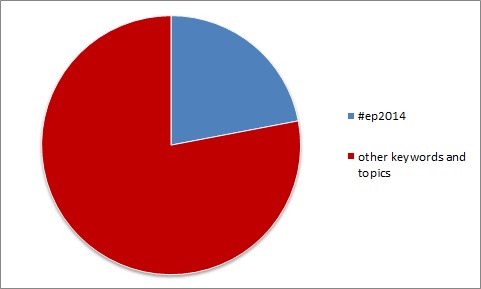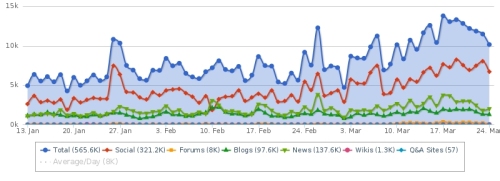The online conversation about the European elections provides some fascinating insights into the issues at stake, the electoral process and the positions of the protagonists from the different sides of the debate.
But if we step back a bit from the specifics of the election campaign, what can these online exchanges tell us more generally about the state of digital engagement with the EU and the Europe’s evolving “digital public sphere”?
Two months before the polls close, online activity is continuing to grow steadily (currently averaging more than 10,000 mentions of keywords related to the upcoming European elections every day). But what I find most striking is the diversity of the online conversation. This provides pretty convincing evidence that the EU’s online public sphere now extends far beyond a hardcore of Brussels-based insiders.
Geographic diversity
As the map above shows, posts on digital media relating to the European elections are not limited to the “Brussels bubble”. In fact, looking back over the last couple of months, Belgium is only ranked 8th in the list of top countries (see table below). Spain currently appears to be the country with the most lively online debate, followed by Greece, the USA, Italy and Germany.
Linguistic diversity
And the online conversation about the elections is far from being an English only affair. In line with the findings on geographic diversity above, Spanish is actually the number one language, and Greek comes a close third behind English (followed by Italian, French and German).
Thematic diversity
Use of the #EP2014 hashtag on Twitter is increasing (61% rise in mentions over the last 28 days) but it still does not capture the full extent of the online conversation relating to the European elections. In fact, after taking into account other topics and keywords relating to the elections, it seems that the #EP2014 hashtag is only used in around 22% of the posts made on digital media over the last month.
Diversity of platforms
According to several commentators (and as I have speculated here on this blog) 2014 may turn out to be Europe’s first “Twitter election”. However, as we can see from the chart below, while social media (and particularly Twitter) have clearly become a popular forum for discussions about the European elections, we should not forget to keep an eye on other online channels, particularly news sites and blogs.
Diversity of profiles?
With the data and analytics tools we currently have at our disposal, it is more difficult to build a detailed picture of the types of people and organisations who are participating in the online conversation about the European elections. What is the relative weight of the political parties, the EU institutions, candidates, observers, analysts and other actors? To what extent are ordinary citizens and voters using digital media to express their views and to engage in the debate? It will be interesting to delve further into the data in order to try to find answers to questions like these as we approach the elections in May, particularly around the time of the TV debates with the political parties’ candidates for Commission President.
Filed under: Digital media, EU Tagged: #EP2014, data, European elections 2014, public sphere, social media
![]()
Original post






Leave a Reply
You must be logged in to post a comment.